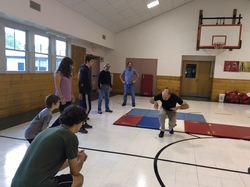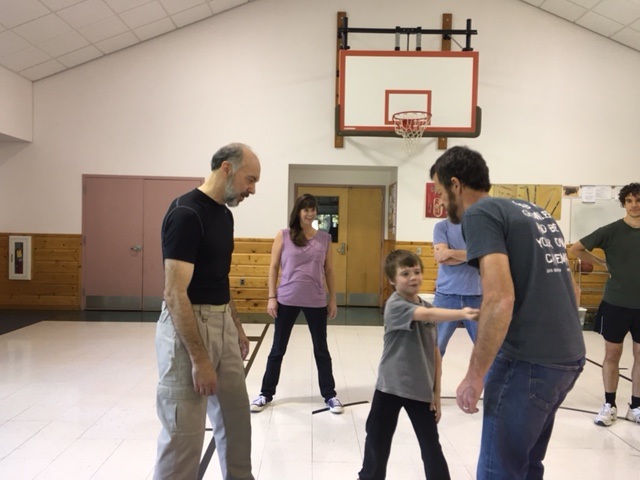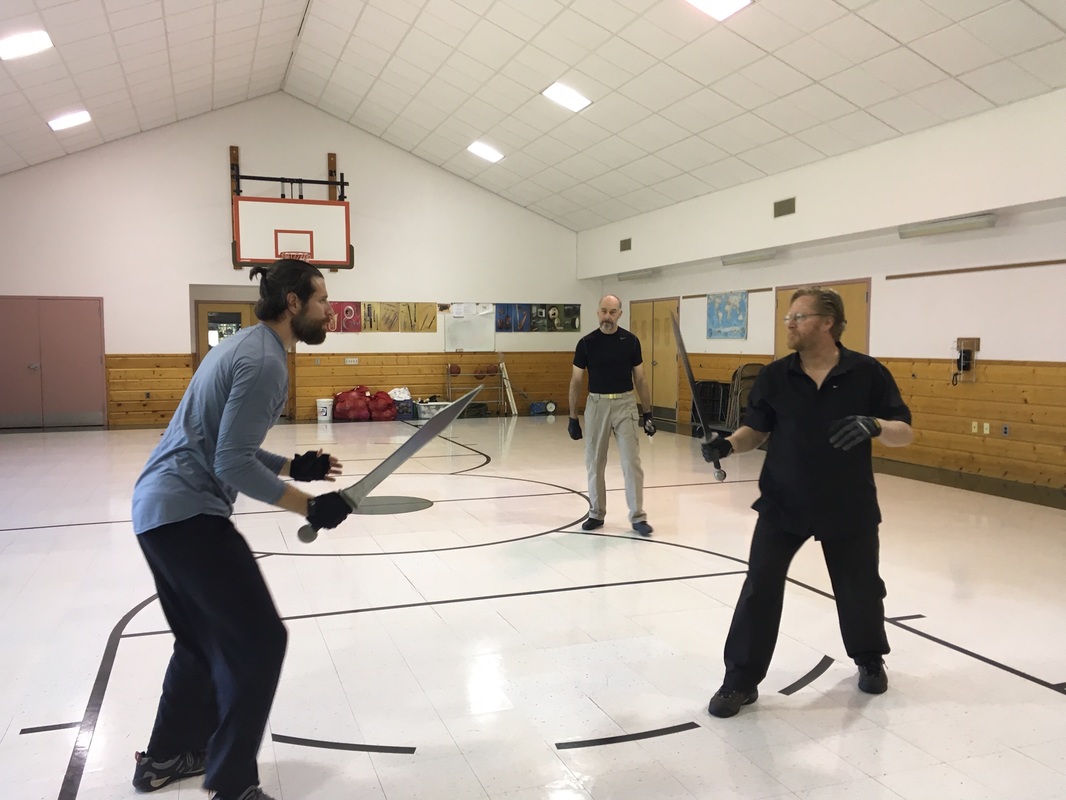|
We are very lucky to have two Shakespeare theater experts to work with our large cast. I don't have the time in our tight rehearsal schedule to give everyone the time and attention they deserve. But with Gaen and Lindsay on the team, we are able to take people aside and really dive deeply into the text. It's amazing what discoveries and connections these two women are able to bring to the work.
Gaen Murphree (verse coach) got her start in Shakespeare touring Oregon and Washington as part of Portland’s Shakespeare in the Parks. She holds an MFA in Theatre Directing from the University of Washington School of Drama. Murphree taught text analysis and directed productions in the MFA acting program at the American Conservatory Theatre and first came to Vermont to each theatre at Marlboro College. She has worked at such theaters as the Seattle Repertory Theatre, the Intiman Theatre, the Actor’s Theatre of Louisville, and the San Francisco Mime Troupe. Lindsay Pontius (verse coach) As THT’s Education Director and creator of Shakespeare It’s Elementary, Lindsay brings Shakespeare to over 400 students in 10 different schools from Rutland to Winooski. Lindsay is a member of Shakespeare & Company where over the years she has been an actor, director and teacher. She also teaches acting in THT studio programs and directs the THT Young Company. She will be acting in MAW’s upcoming production of It’s A Wonderful Life in December.
1 Comment
 Fight Director Paul Ugalde spent the afternoon prepping our cast on the basics of stage combat. His expertise and professionalism are a joy to behold. He sketched out some of the moments of violence in the play, and our youngest cast member, Chance Koenig, learned to throw a stage punch as well as how to be the victim that is always in control of the action. It's not going to be easy to see the unbelievably adorable Chance get rubbed out onstage.
Craig and Jeff looked pretty darn good wielding those heavy steel swords! I have been working with Craig Maravich on Macbeth's soliloquies quite a bit lately, in and out of official rehearsals. We are finding some really interesting things, and Craig is bringing out some unexpected qualities in the Scottish Thane.
Craig asked the question, what is Macbeth like before he kills Duncan and starts to fall apart? We don't have many scenes that establish who he really is before he makes that fateful decision. But we do have several very telling speeches; first "This supernatural soliciting cannot be ill, cannot be good..." wherein we see Macbeth tormented by uninvited images of killing Duncan. His hair stands on end and his heart is pounding. He is practically frozen with anxiety. He hopes that maybe he won't have to take any action at all, and that 'chance may crown me without my stir'. Then we have the soliloquy where he bolts out of dinner with Duncan to argue himself out of the murder. 'If it were done when tis done, then it were well it were done quickly....' It takes him very little time to convince himself that killing Duncan is a bad idea. He speaks of Duncan's virtuous nature. He understands that what goes around, comes around. He is very articulate in expressing why he should not kill the King. Even in the dagger speech, he seems to understand that he is being undone by the viciousness of the deed he is about to do. Craig is exploring this sensitive and thoughtful side of Macbeth's nature, and it makes all the sense in the world. The fact that he seems a pretty good guy, makes his transformation into a tyrant all the more tragic. Late in the play when he learns his wife has died, we get the beautiful and haunting speech, 'tomorrow and tomorrow and tomorrow...' We have found that this is not just bitter nihilism or philosophy, but an way of trying to deal with a grief so deep and painful that he can barely confront it. Especially in his numbed and alienated state. I think a Macbeth that we can relate to, even like, is a much more interesting Macbeth. Having directed Richard III, the difference between these two 'monsters' is striking. Richard is an unapologetic machiavel. He doesn't have a moral nature to begin with. He is filled with bitterness and a desire to get revenge on those he feels are more naturally blessed than he is. He is supremely arrogant. Macbeth, on the other hand, is keenly aware of his moral nature. He transgresses with the full knowledge that he may be destroying himself. Yet he does it anyway...that is one of the most intriguing questions of the play, and one we will keep trying to unpack! What is very striking about Macbeth rehearsals so far, is just how BIG and GRAND Shakespeare's language is.
The way he strings words and images together has an almost magical quality. If the actor can invest all their passion, intention and imagination into those words, the work takes care of itself. Many modern actors, without the experience of doing this, can shy away from the sheer size and heft of the language. We are used to acting 'off text', of creating sub-text, of acting between the lines and using pauses and other means to imbue richness and meaning in our work. Amazingly, with Shakespeare, we don't have to do that! There is no sub-text! Shakespeare puts everything the characters are feeling and doing right into the lines. We will be doing lots more work on investing everything we have and are into the amazing language we have been given. The sounds themselves hold the keys! First rehearsal come and gone! We have a wonderful group of people assembled and what a joy to hear the play read in their voices.
It's a good cutting, I believe. Tight, fast and furious and the rhythm's of Shakespeare's words providing for a wonderful ebb and flow of tension and pace. There are so many lines in this play that stick with you. So many that reverberate in our culture to this day. Macbeth's riff on sleep, for one: "The innocent sleep, Sleep that knits up the ravelled sleeve of care, The death of each day's life, sore labor's bath, Balm of hurt minds, great nature's second course, Chief nourisher in life's feast." As a major lover of sleep myself, I find these lines so eloquent, so telling, so true....ah, speaking of sleep, I must to bed, to bed, to bed... More rumination on great lines soon. Witches have always fascinated me. So how wonderful to finally be directing a play with real live witches in it!
The first thing I asked myself is, 'what is scary about a witch?' What still has the power to frighten and unsettle? Definitely not the 'old hag' version that we are overly familiar with from Halloween images. When I was a girl, witches were a big part of my life. I fancied myself a witch, and had a best friend who was my witch sister. We had names, artifacts, a family history, and we spent many hours inhabiting our witch world. One vivid memory I have is of a letter that I wrote in red ink, describing what I wanted to do to some boy in my class who had offended me. I drew a picture of him cut in half and reassembled the wrong way, with his legs and torso atop his head and chest. I was definitely not a nice witch! The thing I craved in my little girl world was power. Power to hurt those who I felt had hurt me. Power to lord it over those to whom I felt invisible. The idea of a young person with infinite power scares me. A person whose sense of the other is not developed, whose moral sense is similarly undeveloped, is truly unnerving. Maybe that is partly why I chose to cast my Macbeth witches, the 'weird sisters', as adolescent girls. I've seen some pretty scary girl behavior in myself, and I've seen it in my daughter's world when she was in middle school & beyond. It can be vicious; though of course, not always! Another thought is that, if you were an evil spirit, or some sort of dark energy, able to take on human form, why would you take on the diminished form of an old person? Wouldn't you want a young, beautiful, strong body? I sure would! We know that women were labeled witches in old times as a means to persecute them. We know that they were not witches at all, but simply women with knowledge of herbs, or healing, or unusual or different sorts of women. These are not the sort of witches you will find in our Macbeth. Our weird sisters are channelers of the natural destructive energy in the world; they are not human, but supernatural. Let the fun begin! This year, and in particular, this fall, a lot of theater companies are producing Macbeth. Northern Stage, in White River Junction, is doing it, and my former company, Hudson Valley Shakespeare Festival is doing it, among many others.
Why this particular play? Well for one thing, it's the 400th Anniversary of Shakespeare's death, and many theaters are celebrating by doing his plays. For another, it's a political season, and Macbeth is about an ambitious, ruthless man who seizes political power by the worst possible means. Sound uncomfortably familiar? We should at least be thankful we have a choice in the matter; Presidents are not Kings, not yet, anyway. In Macbeth's time the game of thrones was entirely out of the public's hands. But for me, Macbeth is not primarily a political play. It is a psychological study of a man who is at war with himself. Macbeth embodies the ideals of the pagan hero. He is brave, ruthless and strong. But he also has a moral nature, he is aware of what is right and what is wrong. There is a christian overlay in his psyche, eroding the conviction of the pagan notions that guide him on the battlefield. Scotland is a borderland, between Christian England, and the barbaric Norse. It's a borderland fraught with peril, inside and out. One of the biggest challenges in undertaking Shakespeare in Vermont is casting. There are a lot of talented actors in Vermont, but not that many with a depth of experience with Shakespearean text.
One of the most rewarding things I found through this process was the number of talented young people eager to gain this experience. We cast quite a few youngsters, starting with Chloe Clark, Anna McIntosh and Georgia Malone-Wolfsun to play the witches. Chloe and Anna are Middlebury Middle and High School students, and Georgia is a Burlington High School Student. Our witches are going to be young, beautiful and very eerie supernatural waifs and these girls are going to be wonderful! We also have the talented Theo Wells-Spackman, a 13 yr. old from Middlebury, to play Donalbain and Fleance, and a precocious 7 yr. old, Chance Koenig, to play young Macduff. Chance totally stole my heart during the auditions. He is in love with acting, and, I understand he ran his very own theater camp in his backyard this summer! Also in the cast is Orlando Grant, from Montpelier, a high school senior, son of theater professionals Margot Whitcomb & Neil Worden, and a fine and serious actor who is preparing for a career in the theater. He plays the crucial part of Malcolm. I'll comment more about the rest of the cast in future posts! One of the questions I've been wrestling with as I've been preparing to direct Macbeth is the legend of the Macbeth curse. I like to think I'm not too superstitious, but I do want to respect the feeling of the entire company and so will be searching for a way to deal with the play-that-shall-not-be-named in the theater. On second thought, I'm more superstitious than I admit, and once we get this thing going, I will be as eager as everyone to have fortune smiling on our project. Although Macbeth is not a long play (and I have cut it to considerably less than 2 hours), it IS a big and complex play and presents lots of challenges. How to make it fresh. How to make it scary. How to make it insightful for an audience right here and now. How to keep the audience engaged every moment. Lots to think about!!
|
AuthorMelissa Lourie is the Artistic Director of Middlebury Actors Workshop. Archives
April 2018
Categories |



 RSS Feed
RSS Feed